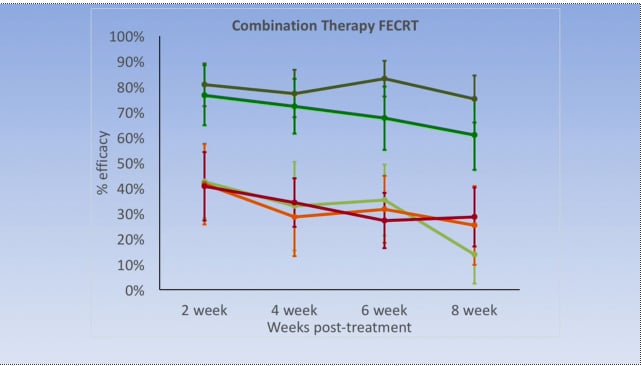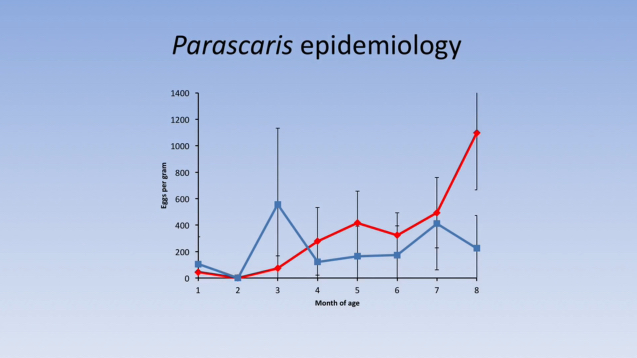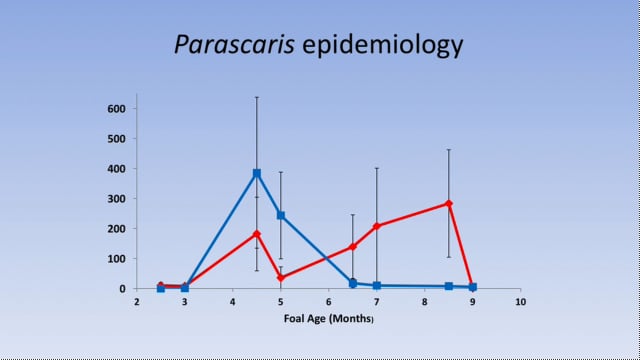
Does the latest de-worming research contain anything promising? There’s a brand new video of a presentation to a group of veterinarians, given by hottie doc Nielsen, presenting his research department’s latest results.
You can watch the 43-minute video on Horse.com but here is the research I find most interesting from what Dr. Nielsen presented:
1. Do de-worming drugs have any effect on inflammation?
One of Nielsen’s projects was to test horses for any inflammation following de-worming. They wanted to determine how and if worming drugs are affecting equine immune systems. While there were minor effects on the mucosal tissue (lining of the intestines), Nielsen reports almost no systemic reaction. They monitored cytokine levels (immune system markers of inflammation) and found no elevated levels.
However, I do wish he had elaborated on the mucosal effects; what do they classify as “minor” effects? And what were the elements they looked at? For example, with humans, you would want to measure the length and thickness of the microvilli. You would also want to sample the gut flora, and then measure the thickness of the mucosal barrier ‘slime’ and so on. So without clarification, this result doesn’t hold much meaning for me. Perhaps there’s a paper out there that provides more detail, but it wasn’t given in this presentation.
2. Do combination wormers – both targeting the same parasite – work better than single drugs?
This was a 1-year study on the miniature horse herd at the University of Kentucky where they experimented with giving two de-wormers at once. But not drugs targeting different worms. In this study they were trying to determine whether attacking the same parasite, with 2 different drugs simultaneously, would yield a better result than using 1 drug per parasite. Apparently, this is common practice now in Australia and New Zealand.
However, although the 1st dose reduced the worm burden by 78%, the 2nd dose (given 2 weeks later) and every subsequent dose (given every 2 weeks for the rest of the year) had 40% or less efficacy.

Nielsen’s conclusion is that giving 2 wormers simultaneously to kill the same pathogen is not a good idea! If you do that, then you basically self-select (~ create) a highly drug-resistant population of strongyles in your horses.
This is something Dr. Nielsen has talked about before and one of the most important aspects of this whole worming dilemma. But I guess it never hurts to have more data to back up an assertion!
3. What is the association between Tapeworm infection and colic?
Dr. Nielsen looked at all the research on this topic and the conclusion is that yes, there’s pretty good evidence that tapeworms can be the cause of colic in the Ileal region of the gastrointestinal tract in horses.
4. Colic surgery in foals
A study tracked 37 foals with colic caused by Parascaris spp. that were taken for surgery. One year later, only 11 of them were alive. This is very important data for those considering colic surgery on foals!
5. De-wormed vs. untreated foals
Nielsen gathered data from the University of Kentucky’s ‘untouched’ herd, yet healthy herd, which tracked 83 untreated foals (no worming meds were ever used) over 13 years and this is what the worm burden looked like. The blue line is ascarids and the red line is strongyles:

Note that there is a peak of ascarids at 3 months of age (600 epg) and then the strongyles take over. There is another rise of ascarids at 7 months of age (400 epg), while the strongyles continue to rise.
Why is that interesting?
Well take a look at this data from a student of Dr. Nielsen’s, who tracked foals from 3 different Kentucky breeding farms over the course of 16 months, who all received the regular (pretty intensive schedule) de-worming drugs:

Look familiar? Again, we have a peak of ascarids at 4 months of age (400 epg), and then the strongyles take over. The drop in strongyles at 9 months of age was because the foals were treated for strongyles at that age.
What isn’t mentioned at this point in the presentation is, again, the fact that repetitive use of de-worming drugs produces resistant parasites! So you might think, ‘Oh good, these foals were de-wormed regularly and now they’re good and their health is assured.’
Nope! What isn’t mentioned is what happens to the now drug-resistant worm burden in these horses over the next 10-20 years? For me, this is the CRUX of all discussions on de-worming and all data, studies, etc. need to circle back to this point.
Dr. Nielsen has also previously discussed this aspect at length and it’s why he emphasizes reducing the worm burden in the environment, rather than using drug de-wormers.
These graphs also reference a point that Dr. Nielsen has likewise made before; the fact that horses (like humans) evolved to co-exist with a parasite/pathogen load. So even in herds that are never wormed – like the herd at Kentucky University – even though they show similar fluctuating worm burdens (and sometimes high epg counts) it does not adversely effect their health (the herd is in very good health) and colic rates remain low.
So why all the hysteria over de-worming horses?
Follow the money, honey.
The financial goals of the pharmaceutical manufacturers also dovetail nicely into our human desire to purify, sterilize and control the health of our loved ones. Even though the facts show this pseudo-control has no effect and may even be harmful – by producing ever-stronger pathogens – still we persist. Often because the doc tells us to.
This is mirrored in the human use of antibiotics. Instead of putting in the work to improve our gut microbiota and immune system, we take a drug to ‘kill the nasties’. Well, by now we all know how that turns out! And we see the same thing happening here with horses.
As Dr. Nielsen is not just a drug company schill, but has shown himself to be a true scientist; with a holistic understanding of parasitology, I would have liked to see him end this presentation on that note.
To avoid buttressing the dominant – but factually incorrect – paradigm of ‘administer a drug, kill the worms, everything’s good’ I think Dr. Nielsen (and others like him) need to take every opportunity they can to keep reiterating these three points:
- Horses evolved to co-exist with parasites. Even completely untreated herds, with high worm counts, and often lesions, are healthy horses with very low colic rates. Keep in mind, these horses live in a herd (not a jail cell) and don’t have humans doing stressful things to them on a daily/weekly basis.
- Ongoing treatment with de-worming medication produces drug-resistant parasites, that are stronger organisms. So over time, repetitive use of wormers actually increases the challenge to the horse’s immune system.
- The real solution to keeping parasitic infestation at manageable, healthy levels is through managing the environment. The horse’s immune system is well capable of shedding/ridding itself of worms. The human’s job is to prevent re-infestation in the cramped environments we provide. This is done through prompt manure removal, field rotation, mixed herd grazing, and composting (on or off-site).
Personally, I have de-wormed my horses once and am now focusing on managing their environment to prevent re-infestation, building their gut flora, and strengthening their immune system via supplementation and herbs (to simulate the 25 plants a day they would naturally forage for if I had enough land for them), along with low-sugar hay to maintain their health, and not vaccinating.
Unless I see evidence of ill health, I doubt I will de-worm them again – unless, of course, they ask me to 🙂

Jini Patel Thompson is a natural health writer and Lazer Tapping instructor. She began riding at age 2 in Kenya, and got her first horse at age 8 in Alberta, and so continues a life-long journey and love affair with these amazing creatures.








We wormed for years. I had a horse die of twisted gut (the first horse I owned) which we came to the conclusion afterwards was caused in part by worm damage. But that horse had spent a winter of complete neglect before he came to me – and I wormed him every month for several months according to the schedule required by my livery at that time. Then some years later we had a horse with a huge burden of red worms which did seem to be in part at least cleared up by worming… Then we came to the conclusion that worm resistance was a real problem. For the past 10 years we have not wormed at all. Nor do we do anything special to ‘manage’ the environment. We have about 30 acres and have had from 13-23 horses at any time – mostly the same population. But we have had horses come and go and have often integrated visitors into the herd (all our horses are together or, at times, in 2 groups). We have observed no particular worm problems and have come to the tentative conclusion that a certain level of worms in an animal’s gut is normal – maybe even beneficial.
That’s very interesting info Marace – thanks so much for sharing your experience with us! So the horse that died of twisted gut is the same horse that was wormed every month, for several months? And then how long after the last wormer was given did he die?
This is really interesting data! In the past when I had my horses at a boarding facility (who wanted regular deworming) I was able to “compromise” and do fecal samples and deworming based on medium or high shedding results only. But since coming to my own farm, the ‘freedom’ has created a big question mark. I am very diligent in manure pick up every day. Last fall I started all the horses on a Redman’s clay and salt which they get every morning and when I did a fecal test in the spring, only two of the six had medium fecal counts – of course I don’t really know if the clay/salt played a role. This fall, I tried the Omega Alpha Para-X along with the Biotic 8 – I was just about to do fecal tests so I’m not sure of the impact, if any, yet. But this tells me that even if I do see a medium or high shedding result, using a dewormer isn’t necessarily helpful.
What type of herbs or supplements do you use? Any thoughts on the helpfulness of fecal tests?
Hi Tina – did you check out my other post:
https://www.listentoyourhorse.com/worming-horses-naturally-is-it-possible/
I believe it answers those questions…
Also check out the comments under that post 🙂